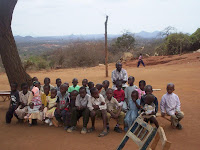I like to keep busy being “useful.” But it is so easy to get buried in busyness, never see farther than my own little circle of activities. Yes, hard work and accomplishment are important. But what about opening my heart to another's need?
I think the second is often harder... we tend to to be selfish, and we don't even realize it most of the time. So I'm glad that the Lord opened my eyes to a little forgotten file on our USB drive earlier this year. It was the beginning of a new journey into the caring heart of God...
"The Savannah Report." Instead of being an outdated school file, I was surprised to discover an update from a Kenyan minister that we knew. For the last several years I had helped contribute toward his ministry, but somehow I had missed the last report. And one with pictures, too! Ten minutes later I was lost in a world I had only vaguely known existed... the vivid description of hunger and loss was poignant, but it was their thirst for hope that brought the tears. I was still wiping them away as I scrolled through the last page. The closing plea couldn't be shrugged off: “It will be my lot to stay with these people...I need your prayers.” And as I prayed, the Lord showed me ways that I could do more.
In a land so impoverished by famine that all able-bodied people soon flee, God had sent one of His children to enter into their needs and offer them hope. In these pages I'm thankful I can share in that ministry.
So what is it like to live on the dry Savannahs, just outside of those world-famous African wildlife preserves? The pictures of their day-to-day needs are vivid and compelling...
In a land of continual drought, there are long donkey treks for water. Some families go as far as ten miles before they can dig enough moisture out of the sand to take home.
 |  |
 |  |
Here, in mud-brick buildings, they meet together for worship and instruction. In a dry and thirsty land, these people are looking for a way of life that will satisfy. What can they hope for amidst such poverty and extreme difficulties? If we can only step closer to find out...




No comments:
Post a Comment